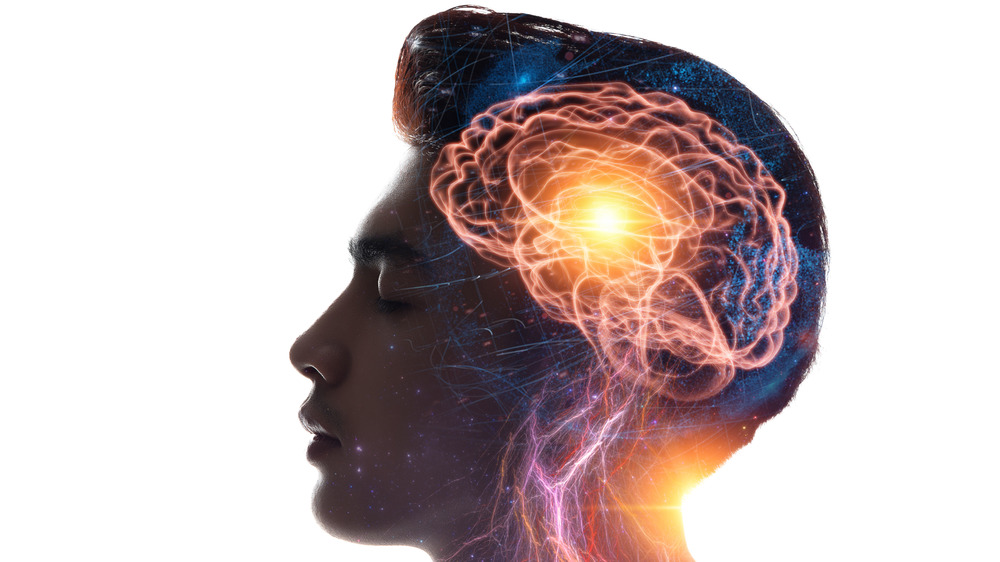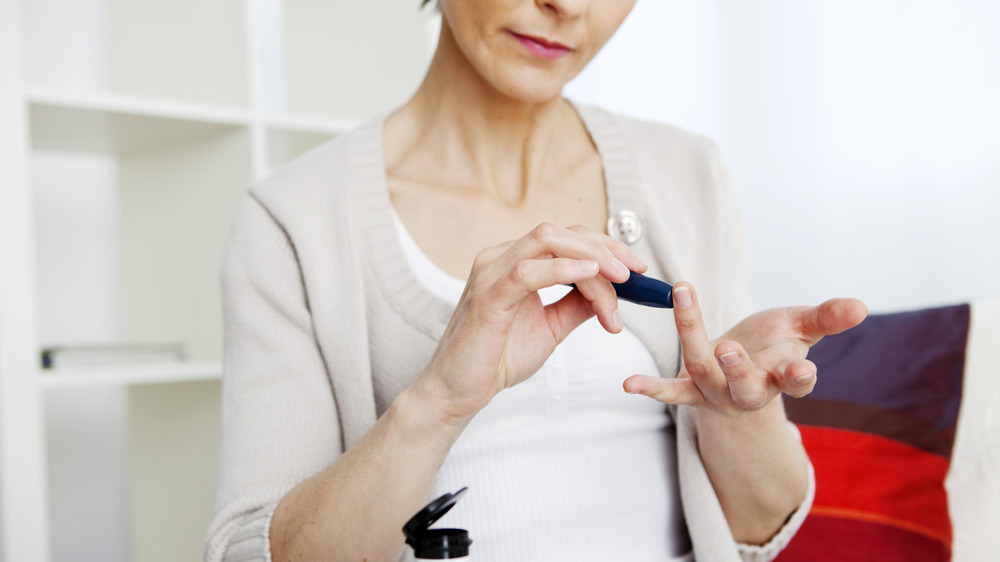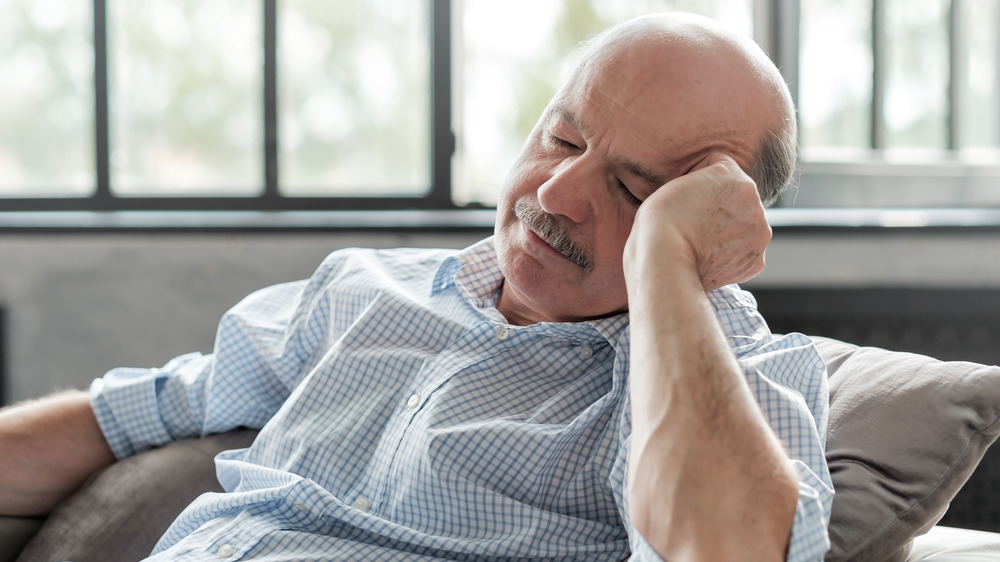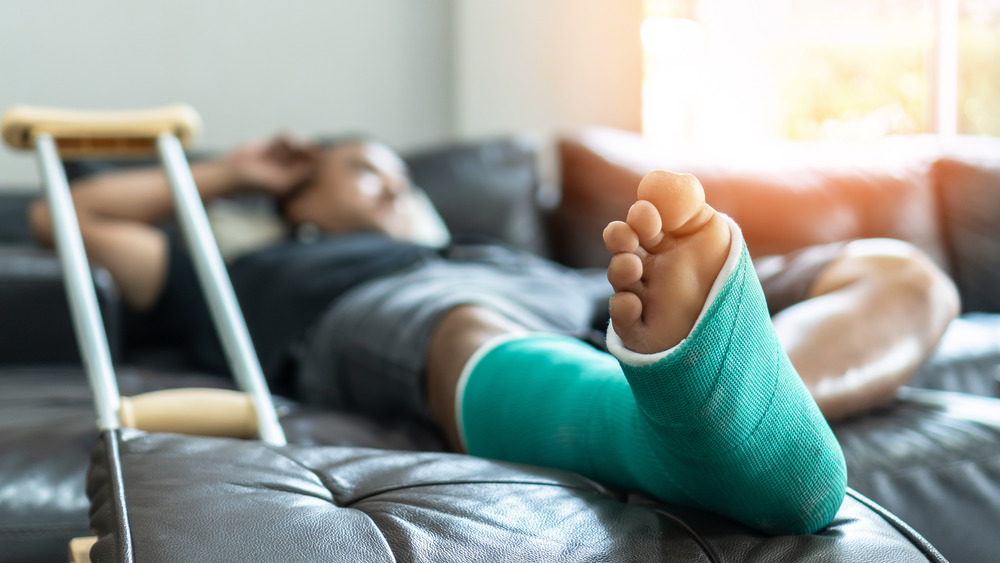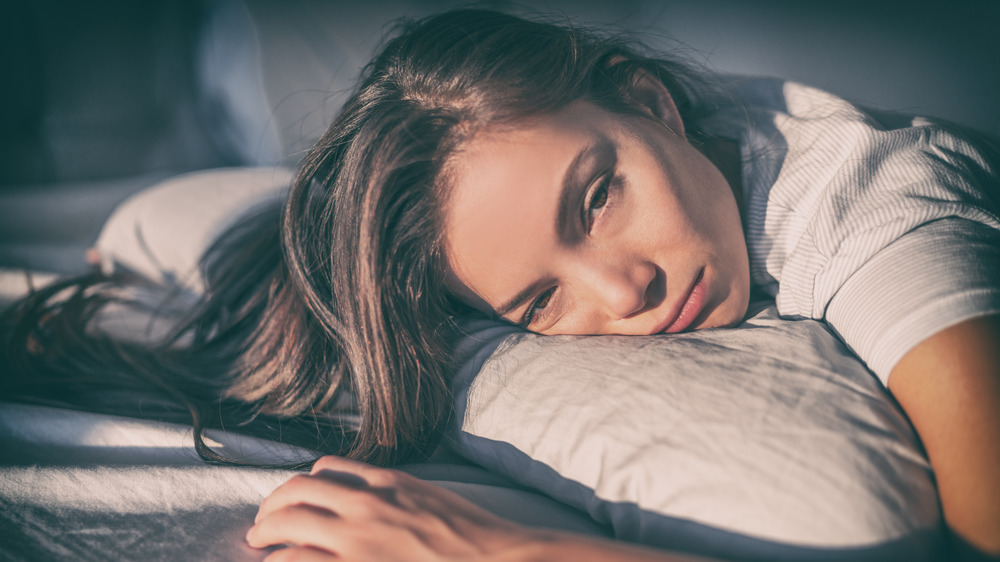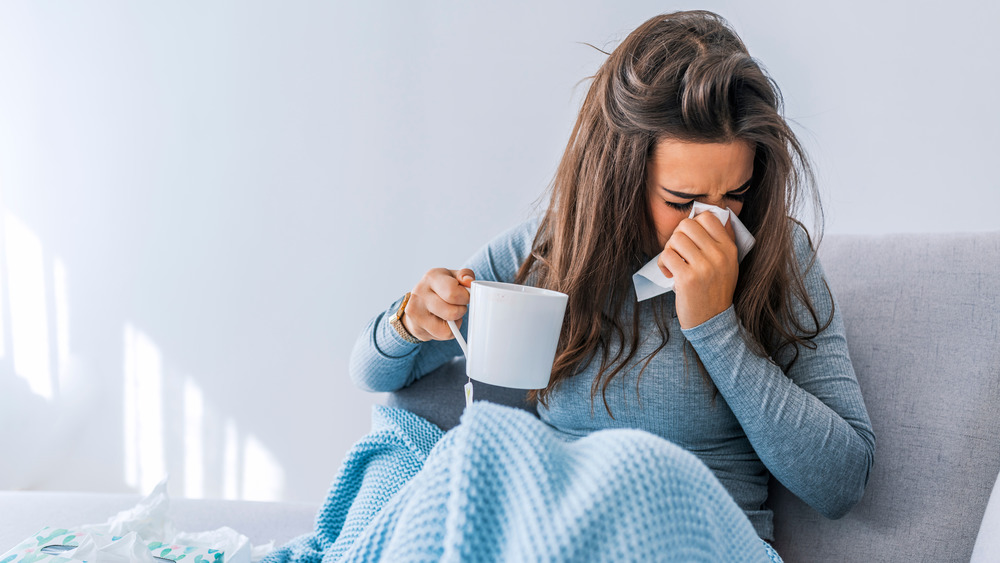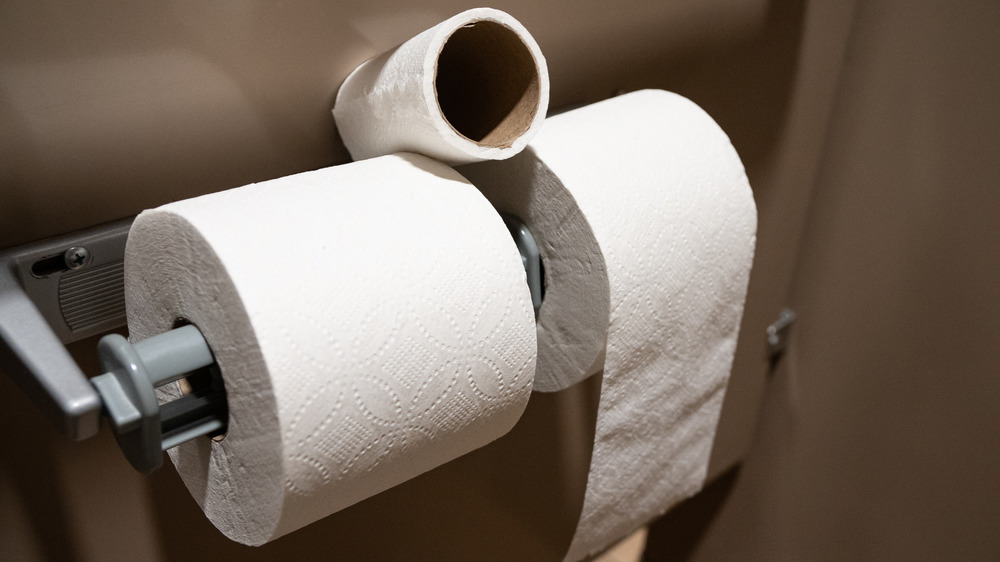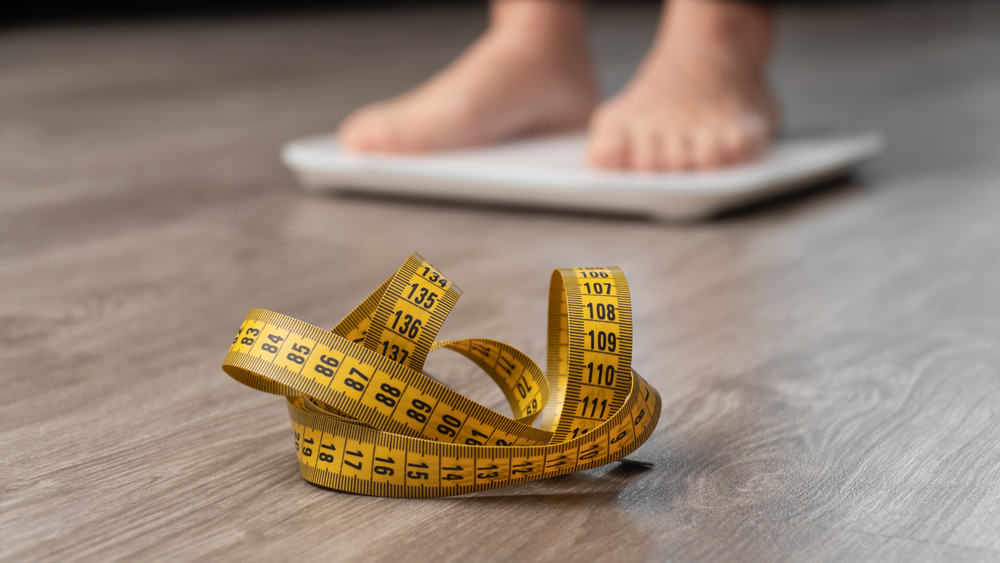When You Don't Exercise, This Is What Happens To Your Body
Exercise may not always feel like something you're meant to do, but humans weren't born to be couch potatoes — at least from an evolutionary perspective. Our ancestors constantly moved around for food and shelter, according to History. Fast forward to the 21st century where the average human isn't running after bisons or traveling every couple of days. While humans have evolved into a sedentary lifestyle, our bodies haven't.
The CDC says that humans need to regularly exercise (for an average of 150 minutes per week) to be healthy. However, the U.S. Department of Health & Human Services reported that less than 5 percent of adults exercise for 30 minutes a day. That means only one in three adults actually adhere to the recommended guidelines.
While one missed gym day won't hurt, not exercising for long periods of time is harmful. Physical inactivity can have a whole host of effects on your body. Here are some ways a lack of exercise can ruin your health.
Lack of physical activity can affect how your brain works
Your brain is like a muscle. By exercising, you're strengthening and training it to work better. But when you get older, it gets weaker and your memory starts to falter. A 2012 study in the BMJ found people aged 45 to 49 showed evidence of cognitive decline. However, signs of memory loss can start as early as your 20s or 30s, a 2010 study found. However, exercise serves as a protective factor against memory decline and dementia, according to Harvard Health Blog.
"Engaging in a program of regular exercise of moderate intensity over six months or a year is associated with an increase in the volume of selected brain regions," Dr. Scott McGinnis, a neurologist at Brigham and Women's Hospital and an instructor in neurology at Harvard Medical School, told the site.
Exercise improves the prefrontal cortex and medial temporal cortex, which control thinking and memory. In addition, exercise can increase the size of the hippocampus, an area of the brain involved in learning and memory. A 2017 review in Frontiers of Physiology also found that exercise works by increasing orexin-A. Orexin-A build new brain cells in the hippocampus, which keeps the brain sharp as you age.
Not exercising increases your risk of heart disease
While not as easily seen as the muscles in your arms, the heart is also a muscle that benefits from working out. The British Heart Foundation explained that exercising helps the lungs bring oxygen to the rest of the body. But when you don't make exercise a habit, your risk for heart disease increases (via CDC).
Being inactive causes fatty material build up in your arteries — blood vessels involved in transporting blood to the tissue and organs, continued the British Heart Foundation. Accumulating fat in the arteries can cause clogging, which increases the risk for heart attack and stroke. Other heart-related issues from being inactive include high blood pressure and blood clots, a 2011 study found.
Heart disease is the leading cause of death for women and men in the United States, according to the CDC. However, you can drastically lower these risks by resuming your exercise routine.
Your mental health can suffer from a lack of exercise
Exercise isn't only beneficial for your physical health, it also helps with mental health. "People know that exercise helps physical outcomes. There is much less awareness of mental health outcomes — and much, much less ability to translate this awareness into exercise action," Michael Otto, a professor of psychology at Boston University, told the American Psychological Association.
Exercise is important in maintaining your mental health. A 2018 study in BMJ Open found physical inactivity increased the risk of depression and anxiety in adolescents. A separate 2018 study in The Lancet Psychiatry looked at the "mental health burden" of adults. It was found that those who exercised had 43.2 percent fewer "bad" mental health days compared to adults who did not regularly exercise. "Just one hour of exercise per week can significantly reduce the risk of depression and depressive symptoms," Adam Fry, a performance science specialist at the Icahn School of Medicine at Mount Sinai, told Insider.
Prioritizing mental health also helps with physical illness, according to the Canadian Mental Health Association. For example, not managing stress can result in everything from headaches to high blood pressure. But, thankfully, exercising can help overcome the negative effects of stress.
By avoiding exercise, you increase your risk for type 2 diabetes
About 422 million people worldwide have diabetes, according to the World Health Organization (WHO). There are also 1.6 million diabetes-related deaths every year. The American Diabetes Association explained that a "lack of exercise" — as well as other factors like obesity — "appear to play roles in the cause of type 2 diabetes."
Type 2 diabetes is defined by a resistance to, or an inability to produce, insulin. "Exercise has been shown to reduce stress levels and also help regulate your hormones, such as insulin," Yasmin Akhunji, an endocrinologist with Paloma Health, told Endocrineweb. Interestingly, a 2011 study in Medicine & Science in Sports & Exercise found that participants who stopped working out for just three days had a harder time controlling their insulin levels.
The best way to manage insulin levels is by combining resistance training and aerobic exercise, per Harvard's Healthbeat. This fitness regimen helps decrease insulin resistance and may be most beneficial for older obese adults with a high likelihood of developing diabetes.
Not getting enough physical activity is connected to an increased cancer risk
A lack of exercise is believed to be linked to an increased risk of cancer, explained the National Cancer Institute (NCI). Conversely, regular exercise has many beneficial effects on the body including, but not limited to, lowering sex hormones levels (which increase breast and colon cancer development), reducing inflammation, increasing metabolism, and preventing obesity — a major risk factor for several cancers, per NCI.
"Throughout the world, 1 of 4 adults is physically inactive, increasing their risk of developing cancer or making it worse," said Alpa Patel, senior scientific director of epidemiology research at the American Cancer Society, to American Cancer Society. Similarly, a 2014 study in the Journal of the National Current Institute found that sedentary behavior — spending a majority of time sitting or lying down —while watching TV increased the risk of colon, endometrial, and lung cancers.
Additionally, a 2019 review in Current Nutrition Reports found sedentary behavior increased the risk of breast cancer by 8 to 17 percent. "Being physically active is one of the most helpful steps people of all ages and abilities can take to protect themselves from cancer," Pate saidl.
Your muscles get weaker when you don't exercise
Use it or lose it. When you're not exercising, muscle mass wastes away, per Healthline. In fact, a 2012 study in the European Journal of Applied Physiology suggested that athletes and non-athletes start to lose muscle after three weeks of not working out. However, a 2015 study in the Journal of Rehabilitation Medicine finds muscle strength disappears after two weeks of total inactivity, with young men losing an average of 17 ounces of muscle mass (via WebMD).
It's also harder to regain muscle strength after its lost. "It's interesting that inactivity causes such rapid loss of muscle mass, in fact it'll take you three times the amount of time you were inactive to regain the muscle mass that you've lost. This may be caused by the fact that when we're inactive, it's 24 hours a day," Martin Gram, co-author of the 2015 study, explained in a press release.
Losing muscle mass, or muscle atrophy, occurs with long periods of physical inactivity, explained Medical News Today. When the body realizes muscles aren't being put to work, they break them down to save energy.
Without exercise, your bones weaken
Beyond drinking milk, staying active can help with bone health. A 2015 study in the Journal of Physical Therapy Science found that exercise can increase bone mineral density. The National Institute of Arthritis and Musculoskeletal and Skin Diseases explained that exercising for bone health is especially important in people older than 20 when bone loss becomes more commonplace.
When it comes to exercise, a 2014 review published in Missouri Medicine suggested that weight-bearing exercise, exercises that involve jumping, and resistance exercise at any age can increase bone mass. To prevent osteoporosis, specifically, Versus Arthritis recommends doing high-impact exercises such as skipping, aerobics, weight-training, running, jogging and tennis. Practicing Tai chi may also help with maintaining balance and reducing your risk of falls. However, you're going to want to approach a new exercise routine gradually.
"If you've never been physically active, or haven't been for a long time, walking is an excellent place to start. As long as you're walking regularly it will be really helpful. As your bones learn to adjust, it's a good idea to do other kinds of activities as well — so add a bit of stair-climbing or resistance training," Carly Ryan, an exercise physiologist, told Health Agenda.
Being inactive can lead to premature death
It can be frustrating to exercise and not see results such as toned muscles or a flat belly. Beyond these benefits, exercise provides another, albeit long-term benefit: living longer. When you don't work out, you're increasing your risk for disease. Research shows this can cause a person to die earlier than they otherwise would.
A 2012 study in The Lancet found that being inactive was associated with a 9 percent increased risk of premature death worldwide. The researchers estimated that by reducing physical inactivity by 10 to 25 percent, there would be about 1 to 3 million fewer deaths each year.
Even if you start exercising later in life, exercise can still help increase your lifespan (via Medical News Today). Harvard Health Publishing explained that for every hour of regular exercise a person gets, he adds two more hours to his life. That's quite the return. Plus, a 2019 study estimated that just 5 to 10 minutes of running could be enough to increase your longevity.
Not exercising leads to unhealthy eating habits
Which would you choose: a Big Mac or a Caesar salad? The answer may change depending on whether or not you exercised today. Exercise can encourage healthier food options — and that's regardless of age. A 2015 study published in BMC Pediatrics found that children were less likely to choose salty foods after exercising versus children who did not exercise. In young adults, a 2019 study in the International Journal of Obesity showed that those who exercised for 15 weeks were more likely to choose healthier food and snack less.
How does exercise help a person choose healthier foods? In response to the 2019 study, Peter A. Hall, a professor at the University of Waterloo, wrote a correspondence to the journal suggesting that aerobic exercise (such as running or cycling) influences brain areas involved in decision-making, such as the dorsolateral prefrontal cortex.
Similarly, a 2018 study in Neuroimage found that when this area was stimulated, it increased the person's ability to be less impulsive when choosing high-calorie food. Another study, published in Brain Stimulation, found that in obese adults, activating the left side of the dorsolateral prefrontal cortex helped aid weight loss and lower food intake.
Inactivity increases cholesterol levels
Cholesterol isn't necessarily bad. At healthy levels, cholesterol is important in building healthy cells. Also, there's healthy cholesterol, called HDL, which removes excess cholesterol from the body by transporting it to the liver. But before you order fast food again this week, the Mayo Clinic warned of "bad cholesterol" called LDL, which increases fatty deposits in blood vessels over time. Since there are no symptoms associated with high cholesterol, it is dubbed a "silent killer" (via HuffPost). High cholesterol is a major cause for heart disease, stroke, and chest pain.
The Mayo Clinic explained that unhealthy lifestyle choices including a poor diet and lack of exercise can build up fatty deposits, making it easier to block blood flow. Studies have shown that exercise can influence both LDL ("bad") and HDL ("good") levels. A 2016 study in Health Promotion Perspectives, for example, found that people who didn't exercise were associated with lower HDL levels; in contrast, people who exercised were associated with higher HDL levels.
You'll have trouble sleeping if you don't exercise
Can't sleep? You may just need some exercise. This might sound counterintuitive, but exercising can help with restful and rejuvenating sleep. This is because exercise can serve as a "protective function against insomnia," per SleepFoundation.org. A 2017 study published in Sleep Medicine found that adults most at risk for developing insomnia tend to smoke or are physically inactive.
While researchers haven't figured out exactly why exercise helps with sleeping, there are some plausible theories. The Sleep Foundation explained that after a workout, body temperature falls. This mimics the drop in temperature that signals the body when to sleep. Exercise also helps to regulate the body's internal clock, called the circadian rhythm, that tells the body when it's time to sleep or be awake.
You don't need washboard abs to get a good night's sleep, though. According to Johns Hopkins Medicine, just 30 minutes of moderate aerobic activity during the day can help you see positive changes in your sleep that same night. "It's generally not going to take months or years to see a benefit," Charlene Gamaldo, medical director of Johns Hopkins Center for Sleep at Howard County General Hospital, told Johns Hopkins. "And patients don't need to feel like they have to train for the Boston Marathon to become a better sleeper."
Lack of exercise can mess with your immune system
Exercise may be just what the doctor ordered. Any physical activity — from taking a walk to weightlifting — can help your immune system fight off infection. A 2019 review in the Journal of Sport and Health Science found that exercising for even less than an hour was effective in boosting white bloods cells, which are essential for defending the body. They also increased immunosurveillance of foreign invaders and lowered inflammation levels. According to Medline Plus, exercise may also help to rid bacteria from the lungs, which decreases your chance for respiratory illnesses like the flu.
Dr. Leonard Calabrese, a rheumatologist and osteopathic physician, told the Cleveland Clinic that the relationship between exercise and immunity was best described as a J-curve. "Being sedentary makes you vulnerable to ubiquitous infections like colds, flus, etc. Exercising moderately, getting our 150 minutes of moderate to high physical activity a week that can be done in five- or ten-minute little bundles, will reduce your risk for these."
However, too much exercise can backfire. "And at the other end is training and training hard, that the sports scientists call overreaching or over-training," Calabrese continued. "That can make you vulnerable, as well."
Physical inactivity can lead to bathroom troubles
Struggling to poop? Well, you might need to move more. "Lack of movement and fiber can contribute to poor bowel function," Isadora Baum, certified health coach, told Simplemost. "By staying active, you can promote regularity within the digestive tract."
Even if you have a digestive disorder, you may be able to find some relief through exercise. Healthline explained, "When it comes to inflammatory bowel disease (IBD), moderate exercise can ease some symptoms of IBD." That said, you're going to want to avoid overly strenuous exercise as that can worsen inflammation.
Considering exercise promotes good digestion, it makes sense that physical inactivity would lead to constipation. A 2013 study in the journal PLOS One found that not working out for a long time increased constipation along with trouble passing gas. But what could help alleviate digestive symptoms? Exercise, of course! In fact, Manhattan Gastroenterology revealed, "Over time, regular exercise can strengthen your digestive tract."
Without exercise, you'll gain weight
As you get older, it becomes harder to shed the pounds. "Aging is one of the biggest factors effecting basal metabolic rate. Unfortunately, it does slow down year after year, which in turn, means most of us do see the number on the scale creeping up in the wrong direction due to a decrease in muscle mass," Jillian Reece, a clinical bariatric dietitian, Tufts Medical Center.
Although you may never be able to burn calories like your 16-year-old self, exercise can help. In fact, a lack of exercise seems to be a greater factor in gaining weight — especially as you get older. A 2014 study in The American Journal of Medicine found that for men and women, the average BMI and waist circumference each increases by .37 percent per year. In addition, results showed a lack of exercise, not diet, was significantly linked to weight gain.
The type of weight gain is not muscular but fat, which can increase your risk for many health conditions. Visceral fat is especially dangerous as it wraps around organs in the body. A 2005 study in the Journal of Applied Physiology found physical inactivity increased visceral fat in overweight men and women. However, by exercising, participants could reverse the built-up visceral fat.


